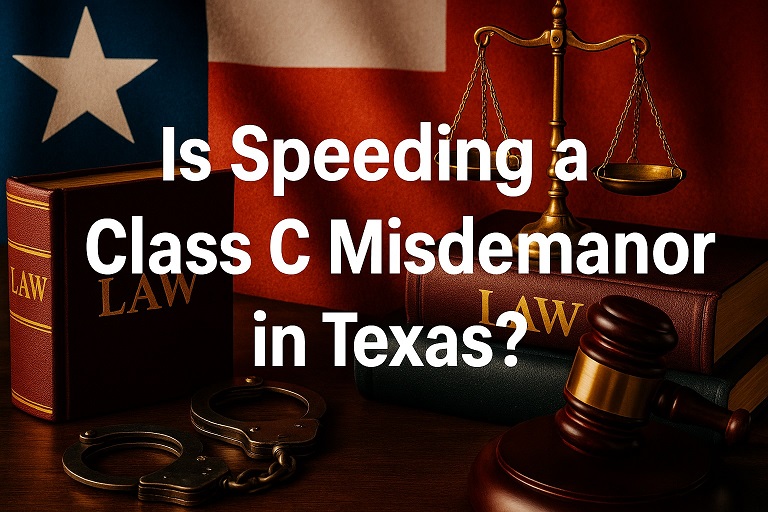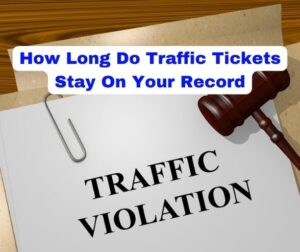In Texas, criminal offenses are divided into two main categories: felonies and misdemeanors. Misdemeanors are further classified into three levels—Class A, Class B, and Class C—based on the severity of the offense. Among these, a Class C misdemeanor is the least serious, carrying no possibility of jail time and punishable only by a fine of up to $500. Despite its low-level status, it is still legally recognized as a criminal offense.
Class C misdemeanors are unique in that they are usually handled by municipal or justice of the peace courts, and often issued in the form of citations rather than resulting in arrest. These citations look similar to traffic tickets and typically require the defendant to respond by a certain date, either by entering a plea or paying the fine. Common examples of Class C misdemeanors include public intoxication, disorderly conduct, minor theft (under $100), and many types of traffic violations—including standard speeding tickets.
What many people don’t realize is that resolving a Class C citation by paying the fine is legally considered an admission of guilt, which leads to a conviction on your record. This is especially important for those who need to pass background checks for jobs, professional licenses, or housing applications. Even if the charge seems minor, the long-term effects of a criminal record can be significant.
Fortunately, Texas courts often offer alternatives to a conviction for Class C offenses. Options like deferred disposition or driving safety courses can help you avoid a guilty finding—preserving your record and preventing insurance or license-related consequences. Understanding the legal definition and potential impact of a Class C misdemeanor is the first step to making informed choices when you receive a citation.
Highlights
How Texas Classifies Speeding Offenses
In Texas, most routine speeding violations are categorized as Class C misdemeanors—the lowest level of criminal offense under state law. This means that even if you’re stopped for driving just a few miles over the speed limit, the resulting citation is technically a criminal charge. While this rarely results in arrest or jail time, the implications can still affect your driving record, insurance rates, and criminal background if not properly addressed.
Speeding violations are typically processed in municipal or justice of the peace courts and resolved by paying a fine, requesting a dismissal option, or pleading not guilty and going to trial. The severity of the offense is usually tied to how far over the speed limit you were driving. For example, going 10 mph over in a residential area is still a Class C offense, but driving 25+ mph over the limit or racing may elevate the charge to a more serious Class B misdemeanor or even reckless driving, which could involve jail time.
There are also specific zones and circumstances that increase the legal weight of a speeding offense. Speeding in a school zone, construction area, or while passing emergency vehicles may carry higher fines and stricter consequences—even if it’s still technically classified as a Class C misdemeanor. Courts tend to take these situations more seriously due to the increased risk to public safety.
To clarify how speeding violations are classified in Texas, here’s a quick breakdown:
| Speeding Context | Classification | Possible Consequences |
|---|---|---|
| 1–24 mph over limit (standard zone) | Class C misdemeanor | Fine up to $500, record of conviction |
| 25+ mph over limit or racing | Class B misdemeanor | Possible jail time, higher fines |
| Speeding in a school or work zone | Class C with enhancement | Heavier fine, court appearance often needed |
| Speeding with prior offenses | Class C or upgraded | Repeat offenses may lead to license issues |
Understanding how Texas classifies speeding is essential because it affects your options for resolving the citation. Knowing whether you’re dealing with a simple ticket or something that could escalate is the first step in protecting your record and avoiding unnecessary complications.
Consequences of a Speeding Ticket in TX
While a speeding ticket in Texas may seem like a minor inconvenience, the consequences can ripple far beyond the initial fine. Because most speeding tickets are classified as Class C misdemeanors, they carry legal weight—meaning they can show up on your criminal record if you simply pay the fine without contesting or resolving it through a court-approved alternative.
One of the most immediate effects is the impact on your driving record. Texas uses a point system through the Department of Public Safety (DPS), and most moving violations—including speeding—add points to your license. Accumulating too many points in a short period can lead to surcharges, higher insurance rates, or even suspension of your driving privileges. If you’re under 25, your margin for error is even smaller; many courts require defensive driving courses for young drivers as a condition for dismissal or reduced penalties.
Insurance companies also take speeding tickets seriously. A single citation can cause your premiums to rise, especially if it remains on your record for multiple years. For drivers with Commercial Driver’s Licenses (CDLs), the stakes are even higher—multiple speeding tickets can jeopardize your job or lead to disqualification from certain routes or employers. What seems like a quick resolution—paying the fine—often results in hidden costs over time.
Beyond the financial implications, there are secondary consequences that many people don’t consider. Some employers conduct regular background checks, and a visible record of moving violations may raise concerns in industries that require driving, security clearance, or public trust. Even if the charge is minor, it may affect decisions around promotions, hiring, or professional licensing. In short, a speeding ticket in Texas is more than just a fine—it’s a decision point that can affect your life for years if not handled carefully.
Can a Speeding Ticket Be Dismissed in Texas?
 Yes—many speeding tickets in Texas can be dismissed, but only if you act quickly and meet certain eligibility requirements. Contrary to what some believe, paying a speeding ticket outright is treated as a guilty plea, resulting in a conviction that appears on your driving and criminal record. However, Texas courts often provide alternatives that can keep your record clean if you qualify and follow the proper steps.
Yes—many speeding tickets in Texas can be dismissed, but only if you act quickly and meet certain eligibility requirements. Contrary to what some believe, paying a speeding ticket outright is treated as a guilty plea, resulting in a conviction that appears on your driving and criminal record. However, Texas courts often provide alternatives that can keep your record clean if you qualify and follow the proper steps.
The most common route to dismissal is deferred disposition, which is essentially a probation period during which you must meet specific conditions—like avoiding new violations and paying court fees. If you comply, the court will dismiss your ticket, and you avoid a conviction. Another widely used option is the driving safety course (often referred to as defensive driving), which allows eligible drivers to take a state-approved course in exchange for a dismissal. This option is usually limited to once every 12 months and comes with restrictions such as having a valid license and not driving 25+ mph over the limit.
For certain administrative violations, such as expired registration or failure to maintain insurance, you may also be able to show “proof of compliance.” If you can prove the issue was corrected (for example, by showing proof that you had valid insurance at the time of the stop), the court may dismiss the charge altogether or reduce the fine.
It’s critical to take action before your court date or deadline. Many courts allow you to request deferred disposition or a driving course online, by mail, or by calling the clerk’s office. Missing your deadline or entering a plea without exploring your options can close the door to dismissal. If you’re unsure of what you’re eligible for—or you want to pursue dismissal without attending court—consulting an attorney can streamline the process and increase your chances of a clean outcome.
Do You Have to Appear in Court for Speeding in TX?
In most cases, you do not have to appear in court for a standard speeding ticket in Texas—especially if you plan to pay the fine or resolve the charge through a dismissal option like defensive driving or deferred disposition. Many courts allow you to handle the entire process online, by mail, or over the phone, making it relatively easy to take care of the citation without ever stepping into a courtroom.
However, there are exceptions. If you were cited for speeding in a school zone, construction zone, or were driving at an excessively high speed (typically 25+ mph over the limit), a court appearance may be required. Additionally, repeat offenders or individuals cited for speeding while committing another offense—such as reckless driving or driving without insurance—may be required to appear in person. Failing to appear when required can lead to a warrant for your arrest, additional fees, and a driver’s license hold.
Even when court isn’t required, attending your hearing can have benefits. It gives you a chance to speak directly with the judge, request dismissal options, and demonstrate your willingness to resolve the matter responsibly. In some cases, judges may even offer more lenient outcomes if you appear and show that you’re taking the violation seriously.
If you’re unable to attend court or simply want to avoid the hassle, you can often hire a traffic attorney to appear on your behalf. This is especially helpful if you’re fighting the ticket or hoping to keep it off your record. The key takeaway: don’t ignore the ticket. Whether you appear or resolve it remotely, taking timely action prevents unnecessary complications and protects your driving record.
How to Handle a Speeding Ticket the Smart Way
Getting a speeding ticket in Texas may be common, but how you respond to it can make a big difference in protecting your record, your wallet, and even your driving privileges. The smartest approach starts with knowing your options—and avoiding the all-too-common mistake of just paying the fine without understanding the consequences. Remember: paying a ticket is a guilty plea, which leads to a conviction that stays on your driving and criminal record.
If you’re eligible, the best option is to pursue dismissal. This could be through deferred disposition, a defensive driving course, or proof of compliance if your citation involves registration or insurance. These routes typically prevent a conviction and protect your driving record from points or public visibility. Be sure to request these alternatives before your court date or payment deadline. Most courts make it easy to submit requests online or by phone.
In situations where you’re not eligible for automatic dismissal—or you believe the ticket was issued unfairly—you have the right to contest it in court. You can plead “not guilty” and request a trial by judge or jury. Presenting evidence, cross-examining the officer, or showing that your speed was justifiable (e.g., due to road conditions or signage confusion) may result in a dismissal or reduction. While this route takes more effort, it may be worth it—especially if your insurance rates or employment depend on a clean record.
If the process feels overwhelming, hiring a attorney can simplify everything. Many attorneys offer flat fees to handle speeding citations, negotiate with the court, and even appear in court on your behalf. This is particularly helpful if you’re busy, out of town, or want to increase your chances of keeping the ticket off your record. The bottom line? Don’t treat a speeding ticket lightly. With a strategic approach, you can resolve it in a way that minimizes long-term impact and keeps your record clean.
FAQs About Speeding Tickets and Class C Misdemeanors in TX
Is speeding a criminal offense in Texas?
Yes. In Texas, a standard speeding ticket is classified as a Class C misdemeanor, which is technically a criminal offense. While it doesn’t carry jail time, paying the fine is considered a guilty plea—leading to a conviction that goes on your record.
Even though most people treat speeding tickets like a minor annoyance, they are part of the criminal code in Texas. That means the consequences of how you handle a ticket go beyond just the fine. A conviction becomes part of your permanent record and may be accessible to employers, insurers, and professional licensing boards. While you won’t be arrested for the speeding itself, that conviction can follow you in background checks and impact how seriously you’re taken in legal or employment matters. Understanding this classification helps you avoid making a quick decision that could affect your record for years.
Can a speeding ticket be dismissed or kept off my record?
Absolutely. Texas courts often allow dismissal through deferred disposition or a defensive driving course, especially for first-time offenders. If successfully completed, these options help you avoid a conviction and keep your record clean.
Deferred disposition is like a probation period where the court agrees to dismiss your ticket if you meet all the terms—typically including no new violations, paying court fees, and possibly completing a defensive driving course. Similarly, many drivers qualify for a full dismissal by completing a state-approved driving safety course within a set timeframe. These options are typically only available before a plea is entered or a fine is paid, so acting quickly is key. By choosing one of these alternatives, you not only save money in the long run but also protect your driving history and reduce the risk of insurance hikes or future license issues.
What happens if I ignore a speeding ticket?
Ignoring a citation can result in a warrant for your arrest, added fines, and even a license suspension. The court may also send the case to collections, which can hurt your credit score. It’s critical to address tickets before deadlines.
Many people assume that a speeding ticket will “go away” if it’s ignored, but Texas courts take non-compliance seriously. Missing a court date or failing to respond by the due date can lead to a capias pro fine warrant—meaning law enforcement has authority to arrest you. If you’re stopped for another violation or during routine identification checks, you could be taken into custody. In addition, DPS may place a hold on your driver’s license, making it impossible to renew. Unpaid fines may even be referred to collections, damaging your credit and affecting loan or housing applications. All of this can stem from one unpaid ticket—so the sooner you act, the better your outcome will be.
Does a speeding ticket affect insurance in Texas?
Yes, a conviction for speeding can increase your auto insurance rates—sometimes significantly. Taking steps to dismiss the ticket or avoid conviction is the best way to protect your insurance premiums over time.
Insurance companies use your driving record to determine your level of risk. A single speeding conviction can result in rate increases for several years, especially if you already have prior violations or if you’re under 25. The impact is even greater for those with Commercial Driver’s Licenses (CDLs), as a blemish on your record may affect your employability or job status. By dismissing the ticket or resolving it through a driving course, you keep points off your license and avoid the rate hike. It’s one of the most cost-effective long-term moves you can make, and it adds up—especially if you’re insuring multiple vehicles or family members on the same policy.



